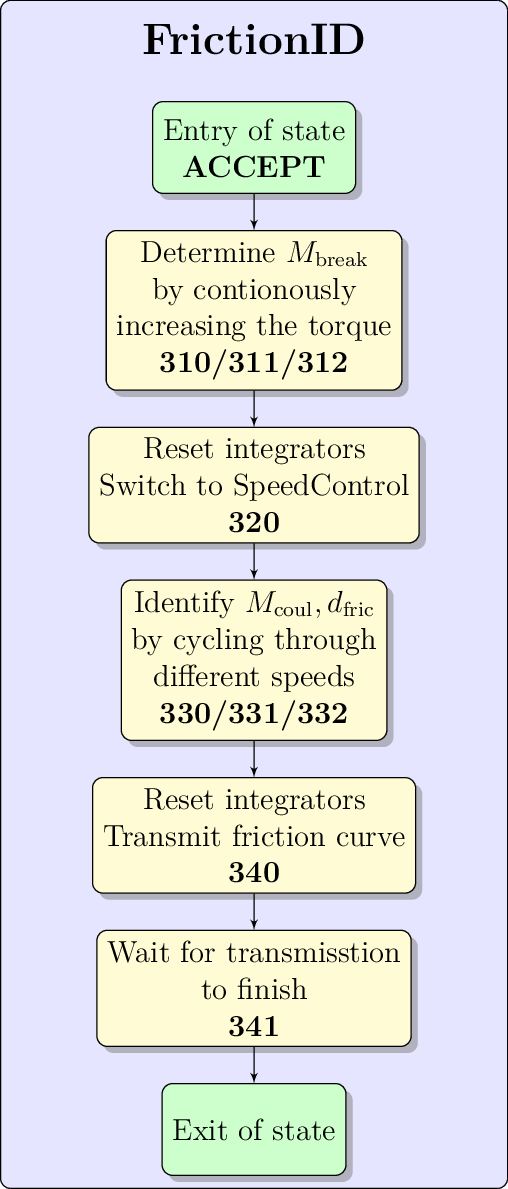FrictionID#
Description#
This state includes an automated identification process for different friction/torque parameters. It is based on [[1]] and has been modified to fit into the ParameterID library of the UltraZohm. The breakaway torque \(M_{break}\), coloumb torque \(M_{coul}\), and viscous friction torque \(d_{fric}\) will be identified. This state requires some sort of speed control.

Fig. 320 Schematic overview of the FrictionID
Necessary measurement values#
i_dq
omega_m
FrictionID object#
-
typedef struct uz_ParaID_FrictionID_t uz_ParaID_FrictionID_t#
Object definition for uz_ParaID_FrictionID_t.
FrictionID config#
-
struct uz_ParaID_FrictionIDConfig_t#
configuration struct for FrictionID specific settings
FrictionID output#
-
struct uz_ParaID_FrictionID_output_t#
output struct of FrictionID
FrictionID functions#
-
uz_ParaID_FrictionID_t *uz_FrictionID_init(void)#
Initializes the uz_ParaID_FrictionID_t object.
- Returns:
uz_ParaID_FrictionID_t* pointer to object
-
void uz_FrictionID_step(uz_ParaID_FrictionID_t *self)#
steps the FrictionID state once
- Parameters:
self – pointer to uz_ParaID_FrictionID_t object
-
void uz_FrictionID_set_Config(uz_ParaID_FrictionID_t *self, uz_ParaID_FrictionIDConfig_t Config)#
Sets the config struct for the FrictionID.
- Parameters:
self – pointer to uz_ParaID_FrictionID_t object
Config – configuration struct for FrictionID
-
void uz_FrictionID_set_ActualValues(uz_ParaID_FrictionID_t *self, uz_ParaID_ActualValues_t ActualValues)#
Sets the ActualValues struct for the FrictionID.
- Parameters:
self – pointer to uz_ParaID_FrictionID_t object
ActualValues – struct for the measurement values
-
void uz_FrictionID_set_GlobalConfig(uz_ParaID_FrictionID_t *self, uz_ParaID_GlobalConfig_t GlobalConfig)#
Sets the GlobalConfig struct for the FrictionID.
- Parameters:
self – pointer to uz_ParaID_FrictionID_t object
GlobalConfig – struct for the general settings of the ParameterID
-
void uz_FrictionID_set_ControlFlags(uz_ParaID_FrictionID_t *self, uz_ParaID_ControlFlags_t *ControlFlags)#
Sets the ControlFlags struct for the FrictionID.
- Parameters:
self – pointer to uz_ParaID_FrictionID_t object
ControlFlags – pointer to the struct with the enable signals of the ParameterID
-
bool uz_FrictionID_get_enteredFrictionID(uz_ParaID_FrictionID_t *self)#
Gets the status of the enteredFrictionID flag.
- Parameters:
self – pointer to uz_ParaID_FrictionID_t object
- Returns:
true state has been entered
- Returns:
false state hasn’t been entered
-
bool uz_FrictionID_get_finishedFrictionID(uz_ParaID_FrictionID_t *self)#
Gets the status of the finishedFrictionID flag.
- Parameters:
self – pointer to uz_ParaID_FrictionID_t object
- Returns:
true state has finished
- Returns:
false state hasn’t finished
-
uz_ParaID_Controller_Parameters_output_t *uz_FrictionID_get_FOC_output(uz_ParaID_FrictionID_t *self)#
Gets the pointer to the output controller struct of the FrictionID.
- Parameters:
self – pointer to uz_ParaID_FrictionID_t object
- Returns:
uz_ParaID_Controller_Parameters_output_t* pointer to the FOC controller parameters struct
-
uz_ParaID_FrictionID_output_t *uz_FrictionID_get_output(uz_ParaID_FrictionID_t *self)#
Gets the pointer to the output struct of the FrictionID.
- Parameters:
self – pointer to uz_ParaID_FrictionID_t object
- Returns:
uz_ParaID_FrictionID_output_t* pointer to the output struct